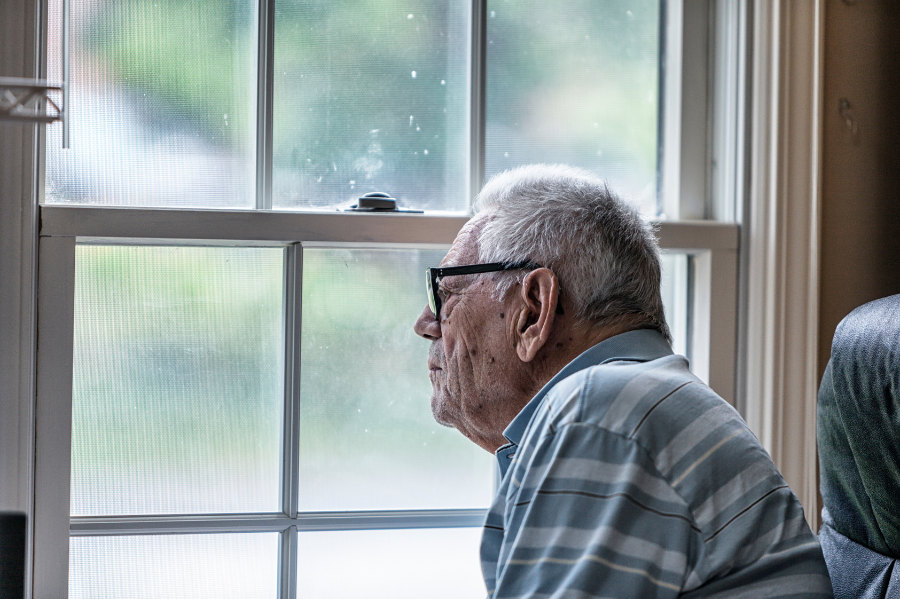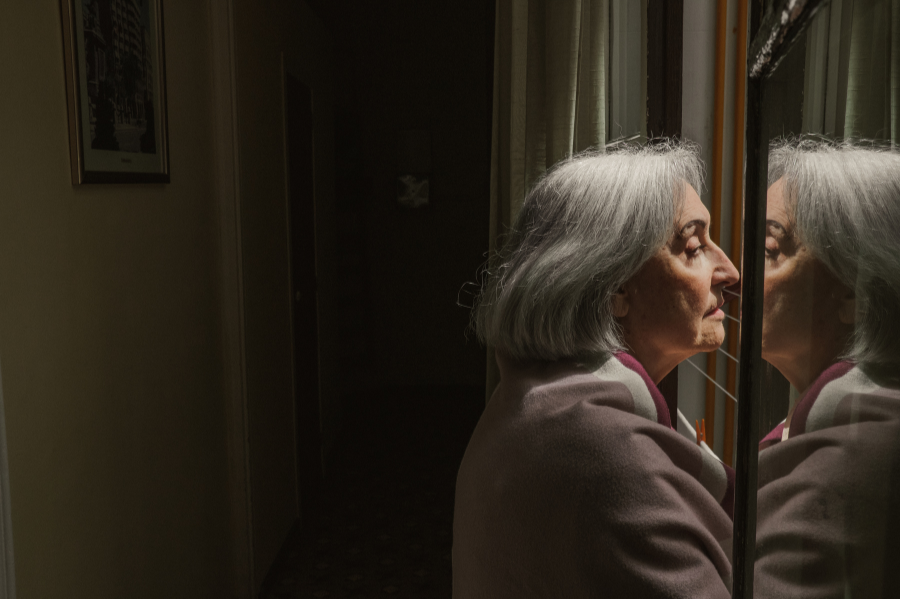
Dementia is often seen as one of the most terrifying health issues one can face. Much of the reason is that people with dementia don’t just lose physical function, their mental function decreases as well. People with dementia often become shadows of their former selves, with losses in their ability to understand and engage with the world around them.
While the progression of dementia varies depending on the individual and the underlying cause, dementia tends to be slow and drawn out. There are often sudden changes in capability and lucidity as well, making the condition confusing for everyone.
Still, despite the presence of good days, dementia does have a progressive downward process and is eventually fatal.
But, do dementia patients know they’re dying?
The question is extremely relevant for end-stage dementia patients, as they have been through dramatic cognitive changes. They may have little connection to the present time and the world around them.
Plus, the sudden dips and rallies in a dementia patient’s capabilities can be confusing for people on the outside. Imagine how those must be if you were actually experiencing such changes yourself.
The obvious answer to this question is that we don’t know. No one can see into the mind of a dementia patient to know what they’re experiencing. The dementia experience is also very different from one person to the next.
Still… there are some conclusions we can draw based on behavior and the things caregivers observe.
Do Dementia Patients Know They Are Dying?

Late stage dementia patients have often regressed far within themselves, seeming to live within a different world at a different time. The inability to recognize loved ones is one of many signals of the disconnect between those with dementia and their environment.
Such effects aren’t surprising, given conditions like Alzheimer’s disease have dramatic effects on a person’s brain. You’ve doubtless seen this yourself if you’ve been caring for a person with dementia.
If someone is this disconnected from the world (and themselves), it’s likely that they have little understanding of their own death. Even if they do have moments of awareness, they’re likely to quickly forget again.
Beyond this, death is a complex idea. It includes considerations of spirituality, of consciousness, and what happens when the body and mind are separated.
The ability to think and process information appears to decrease as dementia progresses. As a result, people in the late stages of dementia may not be able to process what the changes in their body might mean.
Awareness Differs Considerably
While dementia decreases a person’s ability to think, understand, and connect, there’s a ton of variation. This includes differences from one person to the next, differences based on the stage of dementia, and seemingly random shifts in awareness.
For the most part, people in the early stages of dementia are more aware than those in the late stages. Early on, they may be worried about their symptoms and their eventual death (if end-of-life conversations haven’t been had before this point, they should be initiated now), while awareness often decreases as the symptoms progress.
This suggests that people who die relatively early in their dementia journey may have more awareness and potentially more fear than those who die later. However, that’s a huge generalization, as experiences are very different from one person to the next.
There Are Moments of Clarity
Inconsistency is a notable feature for many types of dementia.
This means that behaviors and awareness change over time, often quite suddenly. This is most obvious in the early stages of dementia, where a person may suddenly become confused and overwhelmed, even if they were present and clear-minded the minute before.
Confusion tends to increase as the disease progresses, yet even here there is variation.
You’ll likely find that the person with dementia is more aware some days than others. This could mean that they recognize you every so often or that they appear engaged with you some days.
In fact, some dementia patients experience something called terminal lucidity, where they suddenly seem to return to themselves shortly before they die. In such cases, a person with dementia might even regain their ability to speak, recognize others, and be aware of their situation.
Limited research means we know little about the prevalence of terminal lucidity or what it means about the death experience for dementia patients.
Still, terminal lucidity and changes in awareness throughout dementia show that we can’t take anything for granted. Even someone who appears completely disconnected from their situation may have moments where they understand.
After all, dementia is characterized by changes in awareness and understanding (sometimes dramatic ones). It’s not surprising that these also occur at the end of life.
They May Understand Some Things
There’s another factor too. Even if the dementia patient is largely unaware that they’re dying, they may still know that something is happening.
They may experience some degree of pain or confusion. They could be aware that their body feels strange and they can’t do what they want to, without understanding why. They might also feel like they’re in a strange place and want to go back home.
Such issues mean that even though the person with dement mightn’t know they’re dying, they may still be distressed as death nears.
Some family members talk about this on caregiving forums. For example, in one case the person with dementia regularly talked about ‘not feeling right’ and mentioned that “something bad is wrong with me”. Another mentioned that “I’m not like this. This is not me.”
There’s A Lot We Don’t Know
Let’s be honest. We know very little about death. There are huge discussions on this topic, including thoughts about what consciousness even is and what happens in the body and mind after people die.
Every answer we do find through research or other means brings with it even more questions.
We also know little about what dementia is like from the inside.
Those who can tell us a little of the dementia experience, like Wendy Mitchell, have an unusual awareness of themselves and what’s happening. They’re also speaking from the early or mid stages of the condition and from times where they have awareness. As such, even these advocates can’t tell us much about being lost in dementia at the end of life.
These factors mean that we don’t know what dying with dementia looks like or feels like.
Most of our understanding comes from what we see when interacting with dementia patients and what they tell us. We can look for subtle movements, facial expressions, and the like, but even these only give us a partial picture.
We simply don’t know what is going on below the surface. There may be many thoughts, emotions, and experiences that don’t register on a person’s face.
For example, in the book Living at the End of Life, Karen Whitley Bell talks about the timing of death. She mentions that some people seem to cling to life until particular people arrive, while others seem to want to die alone. Such patterns can occur even with patients who are completely non-responsive, suggesting a level of awareness that isn’t obvious to the onlookers.
The Conscious Mind Isn’t The Only Factor
This brings us to another point.
When we ask “do dementia patients know they are dying?”, we’re generally talking about conscious awareness. Yet, this isn’t the only way to look at the topic.
Many authors talk about different levels of awareness, including ones that have nothing to do with the conscious mind. It’s very possible that dementia patients have some understanding of what’s happening, even if their minds don’t put this into any type of framework.
The presence of terminal lucidity highlights this idea too.
Some authors talk about how this lucidity might be a way that dementia patients prepare themselves for death. If so, that suggests some level of awareness of what’s happening, even if that awareness isn’t at the conscious level.
Perhaps we’re simply too black and white in the way we think about dementia and awareness. Instead of focusing on whether dementia patients do or don’t know what’s going on, it may be better to consider levels of awareness instead.
So, Do Dementia Patients Know They’re Dying?
It’s impossible to truly know how much late stage dementia patients understand of the world around them, much less what the experience of death and dying is like for them.
What we currently know of dementia suggests that most of the time, those with dementia won’t be aware that they are dying. While they may have moments of lucidity and perhaps even fear, those moments quickly pass and are forgotten.
That said, there may be deeper levels of understanding that we are not aware of. For people with strong faith, such understanding could act as a comfort, providing a sense that things will be okay, even if the senior doesn’t really understand what’s happening.
Others may experience things differently, perhaps with considerable distress. This may be more likely if there is physical discomfort or if they are in an unfamiliar environment.
What Does This Mean for Family Members?
If you’re asking about dementia and death, you probably have a loved one with the condition and want to know what to expect. Perhaps you’re even a caregiver who is worried about the next phase.
In many ways, it doesn’t matter whether the person with dementia understands what is happening or not. In either case, the best thing you can do is to be alongside them. Your presence can be reassuring and help them to feel that they’re not doing this last stage of the journey alone.
For seniors in facilities, having familiar objects nearby can help as well. Doing so can make the environment feel safer and more like home, an effect that may noticeably decrease distress.
If you want more information, here are two books that can help.
Living at the End of Life. While this book doesn’t focus on dementia care at all, Karen Whitley Bell offers amazing insights into what end of life can look like. The book delves into a variety of areas, including emotional and practical challenges, answering many questions that you may have never thought to ask.
Then there’s Loving Someone Who Has Dementia. This book has a greater dementia focus than the previous one, but considers the entire dementia journey rather than just the end. As such, you’ll likely find some chapters much more helpful than others. Still, there’s a ton of valuable information in here and the book is well worth reading (or listening to).
Feeling Overwhelmed?
Check out our Caregiving Consulting service for personalized support and guidance.

Leave a Reply